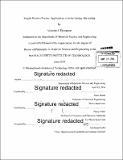Singlet exciton fission : applications to solar energy harvesting
Author(s)
Thompson, Nicholas John
DownloadFull printable version (20.84Mb)
Other Contributors
Massachusetts Institute of Technology. Department of Materials Science and Engineering.
Advisor
Marc Baldo and Harry Tuller.
Terms of use
Metadata
Show full item recordAbstract
Singlet exciton fission transforms a single molecular excited state into two excited states of half the energy. When used in solar cells it can double the photocurrent from high energy photons increasing the maximum theoretical power efficiency to greater than 40%. The steady state singlet fission rate can be perturbed under an external magnetic field. I utilize this effect to monitor the yield of singlet fission within operating solar cells. Singlet fission approaches unity efficiency in the organic semiconductor pentacene for layers more than 5 nm thick. Using organic solar cells as a model system for extracting photocurrent from singlet fission, I exceed the convention limit of 1 electron per photon, realizing 1.26 electrons per incident photon. One device architecture proposed for high power efficiency singlet fission solar cells coats a conventional inorganic semiconducting solar with a singlet fission molecule. This design requires energy transfer from the non-emissive triplet exciton to the semiconducting material, a process which has not been demonstrated. I prove that colloidal nanocrystals accept triplet excitons from the singlet fission molecule tetracene. This enables future devices where the combine singlet fission material and nanocrystal system energy transfer triplet excitons produced by singlet fission to a silicon solar cell.
Description
Thesis: Ph. D., Massachusetts Institute of Technology, Department of Materials Science and Engineering, 2014. Cataloged from PDF version of thesis. Includes bibliographical references (pages 141-147).
Date issued
2014Department
Massachusetts Institute of Technology. Department of Materials Science and EngineeringPublisher
Massachusetts Institute of Technology
Keywords
Materials Science and Engineering.